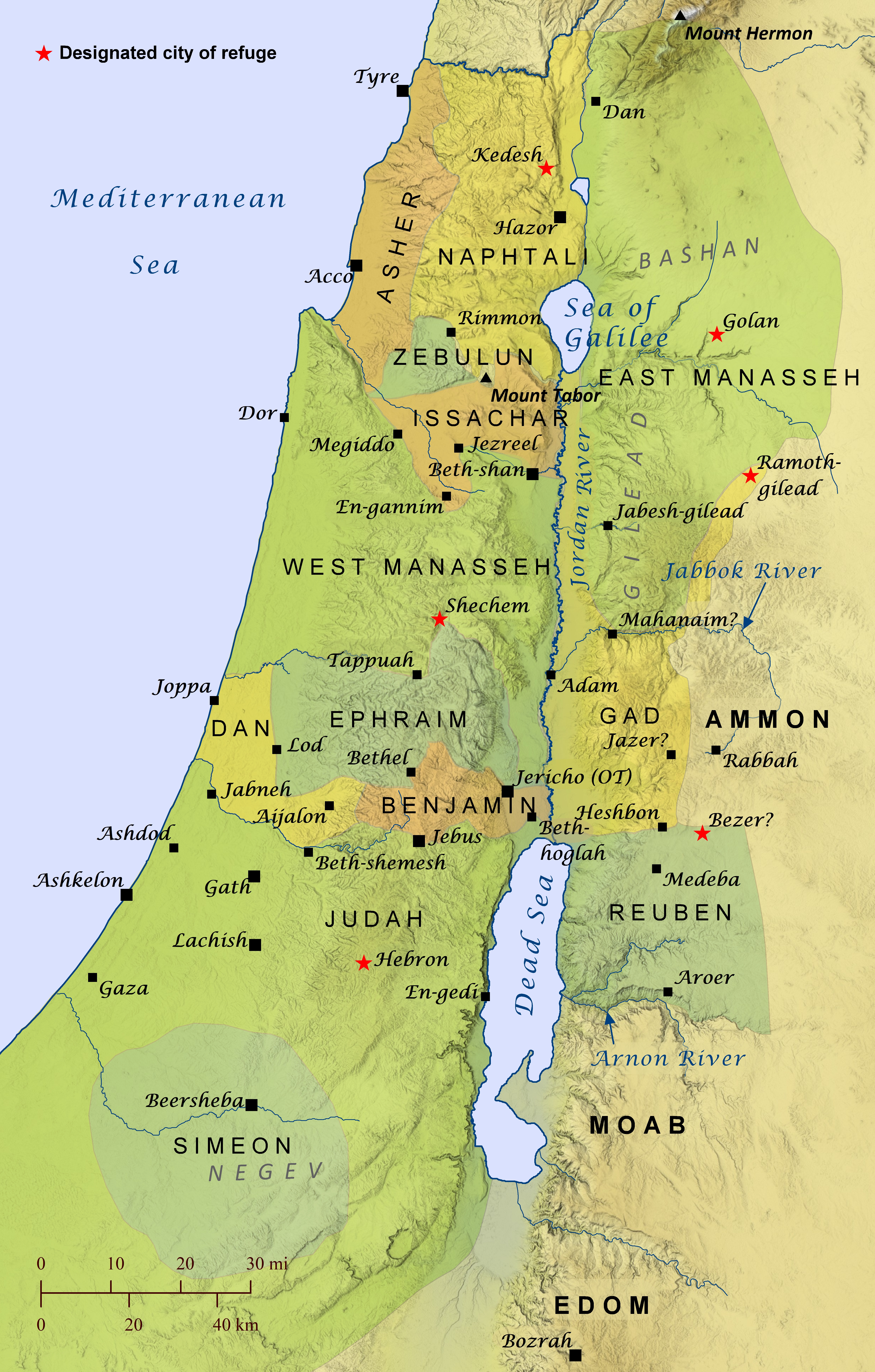Readers’ Version
Literal Version
20:1 The refuge cities
20 Then Yahweh told Yehoshua,[ref] 2 “Tell the Israelis to select some cities that people can flee to in order to be safe, just as I instructed you through Mosheh, 3 so that if someone accidentally kills someone else, they can escape there and be safe from the dead person’s family. 4 When that person flees to one of these cities, they must stand at the city gate and tell the elders there what happened. Then they should bring the person into the city and give them a place there to live in. 5 Now if a relative of the deceased comes to avenge the death, the city elders won’t hand over the killer because the death was accidental and didn’t happen because of hate or premeditation. 6 So then that person must stay in the city until they’re brought before the panel of judges. If they decide that the death wasn’t deliberate, the person must remain in that city until the death of the high priest, then they can freely return to their own city and own home.”
7 So the Israelis chose Kedesh (in the Galilee region in the hill country of Naftali) and Shekem (in the hill country of Efrayim) and Kiriat-Arba (now called Hebron, in the hill country of Yehudah). 8 On the other side of the Yordan river, they chose Betser (in the wilderness on the plateau from the tribe of Reuben), Ramot (in the Gilead from the tribe of Gad), and Golan (in the Bashan from the tribe of Menashsheh). 9 Those were the appointed cities for both Israelis and foreigners living among them, so that anyone who accidentally killed someone could flee there and be safe from being avenged by the deceased’s relatives until they could receive a proper trial.
2 Speak to the_people_of Yisrāʼēl/(Israel) to_say assign to/for_you(pl) DOM the_cities_of the_refuge which I_spoke to_you(pl) in/on/at/with_hand_of Mosheh.
3 So_that_flee there_to a_killer who_strikes_down_of (of)_a_person in/on/at/with_accident in/on/at/with_without_of knowledge and_they_will_be to/for_you(pl) for_refuge from_avenger_of the_blood.
4 And_flee to one of_the_cities the_these and_stand the_entrance_of the_gate_of the_city and_state in/on/at/with_hearing_of the_elders_of the_city[fn] the_that DOM case_of_his and_take DOM_him/it the_city_into to_them and_give to_him/it a_place and_live among_them.
5 And_because/when he_will_pursue the_avenger_of the_blood after_him and_not they_will_deliver_up DOM the_manslayer in_his/its_hand if/because in/on/at/with_without knowledge he_struck_down DOM his/its_neighbour and_not was_hating he to_him/it on_yesterday the_third_day.
6 And_stay in/on/at/with_city the_that until stands_he to_(the)_face_of/in_front_of/before the_congregation for_the_trial until the_death_of the_priest/officer the_high who he_will_be in_the_days the_those then he_will_return the_manslayer and_he_may_go to city_of_his_own and_near/to home_of_his_own to the_city where he_fled from_there.
7 And_set_apart DOM Qedesh in/on/at/with_Gālīl in/on/at/with_hill_country_of Naftālī and_DOM Shəkem in/on/at/with_hill_country_of ʼEfrayim and_DOM Qiryat ʼArbaˊ that is_Ḩeⱱrōn in/on/at/with_hill_country_of Yəhūdāh/(Judah).
8 And_on_side of_Yardēn/(Jordan) of_Yərīḩō/(Jericho) east_on they_assigned DOM Beʦer in/on/at/with_wilderness in/on/at/with_plateau from_tribe_of Rəʼūⱱēn and_DOM Rāmot in/on/at/with_Gilˊād from_tribe_of Gād and_DOM Gōlān[fn] in/on/at/with_Bāshān from_tribe_of Mənashsheh.
9 These they_were the_cities_of the_designated to_all/each/any/every the_people_of Yisrāʼēl/(Israel) and_for_the_stranger the_residing in/on/at/with_among_of_them that_flee there_to any_of one_who_strikes_down_of (of)_a_person in/on/at/with_accident and_not he_will_die in/on/at/with_hand_of the_avenger_of the_blood until stands_he to_(the)_face_of/in_front_of/before the_congregation.
20:4 OSHB note: We read punctuation in L differently from BHS.
20:8 OSHB variant note: גלון: (x-qere) ’גּוֹלָ֥ן’: lemma_1474 morph_HNp id_06H48 גּוֹלָ֥ן

